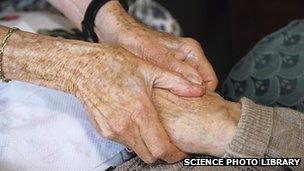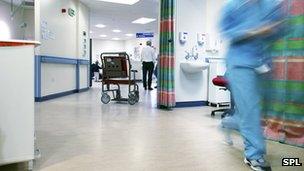Five ways the NHS landscape is changing
- Published
The health service in England has been hogging the headlines.
From hospitals being placed into special measures to the demise of the Liverpool Care Pathway, barely a day has gone by when the NHS has not been high on the news agenda.
But what have we learnt from the past week?
The gloves are off
In February, Prime Minister David Cameron stood up in the House of Commons to apologise to the public after the findings of the Francis Inquiry into the Stafford Hospital scandal were revealed.
He struck a consensual tone.
Fast forward five months to the government statement setting out the findings of the Keogh review - ordered off the back of the Francis Inquiry - and the contrast could not be any clearer.
Health Secretary Jeremy Hunt went straight on the attack, accusing Labour of trying to hide failure when it was in power and "caring more about its own reputation".
A clearly angry Andy Burnham responded by saying the government was "playing politics with people's lives".
The NHS - it is fair to say - will be a key election issue.
Elderly care matters

The way the care pathway has been implemented has come under intense scrutiny
It was not long ago that little attention was given to the way the elderly were cared for.
Not any longer. The Stafford Hospital scandal changed that with ministers, patients and those in the health service all demanding change.
This was once again reinforced by the Keogh review. While it did not solely focus on elderly care and even though nothing on the scale of Stafford Hospital was discovered, the review was clear - mediocrity must not be tolerated.
But the importance of the way the elderly are treated was a theme on other days.
The decision to phase out the Liverpool Care Pathway - dubbed the death pathway - after reports of patients being mistreated and the debate over the cap on social care costs shows there is an appetite for change across the board.
There's a new sheriff... but he has a tough job
The new chief inspector of hospitals, Prof Sir Mike Richards, struck a bullish tone this week, promising to introduce a tougher inspection system.
But he has a difficult job.
Not only has he to get through 161 inspections by the end of 2015, but he has to do this at a time when his employer, the Care Quality Commission, is reeling from its own scandal (it has been accused of trying to cover-up its failures over an investigation into the deaths of mothers and babies in Cumbria).
What is more, the frenzied political atmosphere surrounding care in hospitals (see above) means the stakes are raised.
Every critical report will be pored over in great detail.
Death rates are the new measure of performance

Death rates are available for every hospital in the country
In the 1990s the focus was on MRSA.
During the last decade it was waiting times - whether they related to A&E, hospital operations or GP appointments.
But now all eyes are on mortality rates.
Thanks to the research group Dr Foster there is now a wealth of data out there detailing which hospitals have higher than expected death rates.
This is not the same as saying the deaths were avoidable, just that they were more of them than would be expected.
But that does not mean they will not be used to judge the quality of hospitals in the coming months and years.
Special measures are here to stay
The term special measures has been around in the NHS for some time. Monitor, which regulates foundation trusts, uses it.
But the attention given to the practice - which involves sending in external experts to help turnaround poor performance - will now be sky-high.
The 11 trusts placed in the system following the Keogh review will face close scrutiny.
But the new inspection regime Sir Mike is in charge of is also likely to lead to more hospitals being placed into it.
That is because the new system will result in hospitals getting one of four clear ratings. Those units given the bottom grade - inadequate - will have to put a good case forward for avoiding special measures.